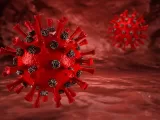
Gene discovery could pave the way for more effective obsessive-compulsive disorder (OCD) treatments.
July 29, 2021Researchers at Columbia University’s Vagelos College of Physicians and Surgeons and numerous other institutions discovered a link between unique patterns of genetic alterations and obsessive-compulsive disorder (OCD) in humans in the first study of its kind.
The work, which was published online in Nature Neuroscience on June 28, supports the viability of targeting individual genes to develop new OCD treatments and points to new avenues for research into this commonly severe illness.
OCD, which affects between 1% and 2% of the population, typically runs in families, and it is well established that genes play a key role in determining who develops the condition. Numerous OCD genes, on the other hand, remain undiscovered.
“Many neurological diseases are caused by highly active mutations that can self-induce disease,” explains David Goldstein, PhD, director of Columbia University’s Institute for Genomic Medicine and a senior author on the present article. “While these mutations are relatively rare on their own, they are critical to discover because they can serve as a starting point for developing medicines that specifically target specific underlying causes of disease.”
Although it has been hypothesised that OCD is caused by highly active mutations, establishing statistically meaningful data has proven difficult.
The majority of previous research on the genetics of OCD followed a “candidate gene” approach, in which researchers focused on plausible genes that could be involved in pathogenesis and searched for genetic risk factors. While this strategy has had some success, it has the potential to create difficulties with statistical interpretation and to overlook unexpected genes. As a result, both funding agencies and the pharmaceutical industry are increasingly concentrating their efforts on genome-wide analyses capable of conclusively linking genes to disease risk.
“The solution is to examine all of the genes in the genome simultaneously and determine whether any of them have substantial evidence of impacting risk.” “That had not previously been attempted on a large scale in OCD,” Goldstein explains.
Goldstein’s team collaborated on this genome-wide method with Gerald Nestadt, MBBCh, a psychiatrist at Johns Hopkins University who had access to a cohort of OCD patients. This strategy identifies important genes anywhere in the genome by combining high-throughput sequencing and computational biology tools.
The researchers examined protein-coding genes in over 1,300 OCD patients and compared them to comparably large control groups using whole exome sequencing. The multi-institutional collaboration also included scientists from the University of North Carolina in Chapel Hill, the David Geffen School of Medicine in Los Angeles, Harvard Medical School, and SUNY Downstate Medical Center in Brooklyn.
The study discovered a strong link between OCD and rare mutations, particularly in a gene called SLITRK5, which has previously been linked to OCD in candidate-gene studies.
Goldstein thinks that the new data for SLITRK5 will tempt pharmaceutical companies and translational researchers to develop drugs targeting this gene.
Additionally, the study discovered a distinct pattern of variation in other genes. “When you look at genes in the human population that cannot tolerate variation, those are the genes that are most likely to cause disease, and with OCD, we identify a significantly higher load of harmful mutations in those genes compared to controls,” Goldstein adds. “This indicates that there are additional OCD genes to be uncovered and where to explore.”
New treatment options for OCD sufferers and their physicians cannot come soon enough. OCD is characterised by uncontrollable, repetitive thoughts and behaviours that interfere with the sufferer’s daily life.
“OCD is a disabling disorder that affects twice as many people as schizophrenia,” says H. Blair Simpson, MD, PhD, a psychiatry professor at Columbia University’s Vagelos College of Physicians and Surgeons and director of the Center for OCD and Related Disorders at the New York State Psychiatric Institute. He was not involved in the new study.
Simpson observes that while two currently available treatments, selective serotonin reuptake inhibitors and cognitive-behavioral therapy, are extremely effective, they only benefit around half of patients. “As a result, these genetic findings are extremely interesting; they imply that the promise of precision medicine may extend to OCD, potentially transforming how this disorder is identified and treated.”
Reference
Halvorsen, M., Samuels, J., Wang, Y., Greenberg, B. D., Fyer, A. J., McCracken, J. T., … & Goldstein, D. B. (2021). Exome sequencing in obsessive–compulsive disorder reveals a burden of rare damaging coding variants. Nature Neuroscience, 1-6.
















